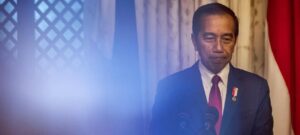 This article explores the consolidation of power in Indonesia under President Joko Widodo, highlighting his ability to effectively manipulate and control opposition forces.
This article explores the consolidation of power in Indonesia under President Joko Widodo, highlighting his ability to effectively manipulate and control opposition forces.
A Disenchanted Beacon of Hope?
With this week’s elections, Indonesian President Widodo’s ten-year term comes to an end. The progressive beacon of hope once seemed to bring a breath of fresh air to politics. But what has become of it? Indonesian President Joko Widodo comes from humble origins. In the past, he would often proudly show reporters the small hut next to a river where he grew up. The former furniture salesman and Metallica fan is the first president of the vast country who does not come from the political elite or the powerful military.
When he was elected president in 2014, the charismatic political outsider became a beacon of hope for many people. Widodo aimed to modernize Indonesia, promising economic growth, less poverty, and corruption-free governance that serves the people rather than the powerful.
Success in the Economy
And Widodo has achieved some successes. Around five percent economic growth per year, less poverty, and rising incomes. Throughout his almost ten-year term, he has focused on infrastructure projects and excelled at wooing investors. He constantly inaugurates new airports, roads, and bridges. Recently, he inaugurated Indonesia’s first high-speed train, a product of cooperation with China.
Widodo believes that improved infrastructure reduces inequality. In 2018, he stated in a speech that he wanted to use infrastructure development to unite the nation, which consists of around 17,000 islands. He also focused on projects in remote rural regions that were neglected by his predecessors.
Widodo’s favorite project is the construction of a new capital city. Jakarta is bursting at the seams and sinking several centimeters every year due to its own weight and rising sea levels. The new capital, Nusantara, on the island of Borneo, is intended to be sustainable and modern. The presidential palace is set to be inaugurated this year, and the first ministries will move. Critics consider the plan unrealistic and would prefer to see the billions invested differently.
Still Very Popular
Jokowi, as the president is known in Indonesia, is ambitious. His popularity among the population remains high, with approval ratings of around 70 percent. He is particularly celebrated for his ban on nickel ore exports, says Denis Suarsana from the Konrad Adenauer Foundation in Jakarta. “The nickel strategy is an absolute hit, which Widodo also uses in parts in a populist manner.”
In 2020, the president banned the export of unprocessed nickel ore with the goal of keeping the resource in the country and attracting the nickel processing industry to boost the economy and create jobs. The goal is for Indonesia to become one of the world’s five largest economies by 2045. With almost 280 million inhabitants, Indonesia has the fourth largest population and the third largest democracy in the world.
Weakening of Democracy
Critics argue that Widodo has transformed during his second term. While he continued to strengthen the economy, he weakened democracy. Instead of further combating corruption, Widodo weakened the anti-corruption agency. At the end of 2022, the parliament passed a stricter criminal code that, according to human rights activists, will further restrict freedom of expression. Amnesty International criticizes it for having Islamist and conservative-authoritarian characteristics. As of 2025, criticizing the president, blasphemy, or engaging in extramarital sex will be punishable offenses.
Furthermore, the man from humble origins has increasingly become part of the elites. He is accused of building his own family dynasty. Widodo’s sons and family members are now also entering politics. The most prominent case is his eldest son, Gibran Rakabuming, who is running as vice president in the upcoming elections. He is 36 years old, which is actually four years too young for the position. Shortly before the nomination deadline, he intends to seek an exception from the Constitutional Court.
A curious detail: the chief justice of the court is Widodo’s brother-in-law, who lowered the age limit for Widodo’s son, claiming that he already holds a high political position. Because Gibran is currently, like his father once was, the mayor of Surakarta. Although the Ethics Council of the Constitutional Court later removed the chief justice from his position, the decision stands: Widodo’s son is allowed to run.

